Children
July 15, 2025
Research Scientist Dr. Emily Begnel receives early career award to study antimicrobial resistance and its effects on gut health and HIV exposure in children
Categories: Awards, Children, Gut Health and Child Survival, HIV and Co-Infections, Research

Congratulations to Dr. Emily Begnel, Research Scientist with Global WACh, for receiving a Thrasher Research Fund Early Career Award to fund “The prevalence of antimicrobial resistance and effects on gut health among children who are HIV-exposed but uninfected.” The award funds early career investigators and their development towards independent research in child health. Dr. Begnel will conduct her research under the mentorship of Drs. Jennifer Slyker and Patricia Pavlinac (UW Global Health and Epidemiology), and collaborate with Dr. Ana Weil (UW School of Medicine) and the Weil Lab.
Antimicrobial resistance (AMR) is rising globally and threatens public health by decreasing effectiveness of antibiotics in treating infections. Children who are HIV-exposed receive the antibiotic cotrimoxazole to prevent a range of bacterial infections; however, there is concern that it may contribute to the development of AMR in these children. There is urgency to better understand the dynamics of AMR development and spread, particularly among children in low- and middle-income countries where AMR is prevalent. Pathogens can transfer resistance genes to the bacteria in the gut microbiome, potentially contributing to long-term AMR. (more…)
May 15, 2025
Dr. Taylor Hendrixson, UW Pediatrics Assistant Professor, receives 2025 CFAR New Investigator Award
Categories: Awards, Children, Research
 Congratulations to Dr. Taylor Hendrixson, Assistant Professor in UW Pediatrics, for receiving a 2025 UW/Fred Hutch Center for AIDS Research (CFAR) New Investigator Award! The two-year award focuses on supporting early career investigators to conduct independent HIV research and apply for future funding to continue their HIV/AIDS research careers.
Congratulations to Dr. Taylor Hendrixson, Assistant Professor in UW Pediatrics, for receiving a 2025 UW/Fred Hutch Center for AIDS Research (CFAR) New Investigator Award! The two-year award focuses on supporting early career investigators to conduct independent HIV research and apply for future funding to continue their HIV/AIDS research careers.
Dr. Hendrixson is a neonatologist, pediatric infectious disease physician and faculty within the UW Department of Pediatrics. His research has focused on improving maternal and early infant nutrition to optimize growth and improve long-term outcomes in low- and middle-income settings. He works on clinical and clinical-translational trials targeting populations at high-risk for nutritional deficiencies and growth faltering. He is the PI of a K23 award investigating multi-omic interactions of the maternal-breastmilk-infant triad and associations with clinical outcomes among women living with HIV and their infants HIV-exposed uninfected in Kenya.
With support from the new award, Dr. Hendrixson will investigate anemia and iron status in pregnancy among women living with HIV and associations with neurodevelopmental outcomes of children HIV-exposed uninfected to guide future interventional studies. (more…)
Postdoctoral Scholar-Fellow Dr. Jillian Neary receives 2025 CFAR New Investigator Award
Categories: Awards, Children, Research
 Congratulations to Dr. Jillian Neary, Postdoctoral Scholar-Fellow with Global WACh, for receiving a 2025 UW/Fred Hutch Center for AIDS Research (CFAR) New Investigator Award! The two-year award focuses on supporting early career investigators to conduct independent HIV research and apply for future funding to continue their HIV/AIDS research careers.
Congratulations to Dr. Jillian Neary, Postdoctoral Scholar-Fellow with Global WACh, for receiving a 2025 UW/Fred Hutch Center for AIDS Research (CFAR) New Investigator Award! The two-year award focuses on supporting early career investigators to conduct independent HIV research and apply for future funding to continue their HIV/AIDS research careers.
Dr. Neary’s past work focused on strategies to increase pediatric HIV testing and improve HIV care for adolescents with HIV. Recently, her work focused on molecular epidemiology including HIV viral control among children with HIV and biomarkers of biological aging among children who were exposed to HIV in utero.
With support from the new award, she plans to explore whether breastfeeding and human milk oligosaccharide composition are associated with child telomere length (TL) among children in Kenya who were exposed to HIV in utero. The evidence fills an important need to further understand how breastfeeding may influence short- and long-term health outcomes.
March 3, 2023
Researchers convene in Nairobi, Kenya on future childhood development research
Categories: Awards, Children, HIV and Co-Infections, Research
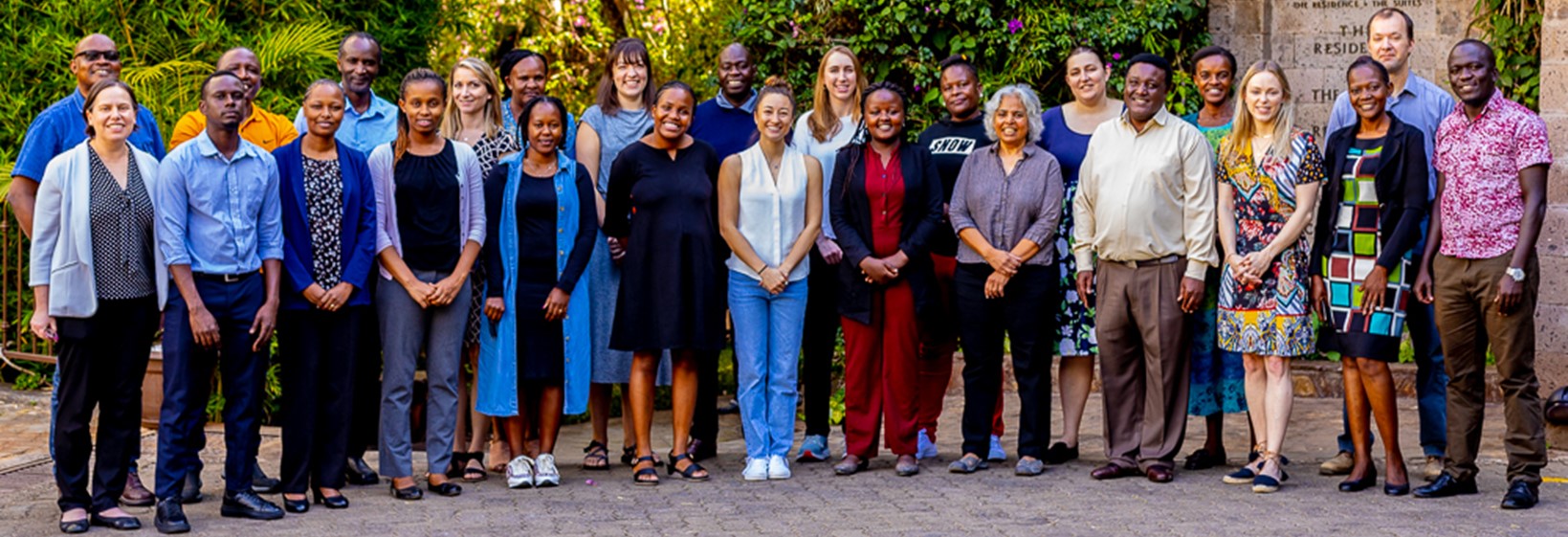
A two-day convening in January in Nairobi, Kenya brought together over 30 investigators from a variety of Kenyatta National Hospital, University of Nairobi, and University of Washington studies that include components of assessing childhood neurodevelopment and mental health. This meeting provided a forum to understand how to leverage the recently awarded Impact of Microbiome, Immune Activation and Drug on Neurodevelopment (MIND) Program for ongoing and future childhood development research. Over the course of the meeting, attendees discussed and prioritized the activities for a new MIND Center of Excellence (CoE) that builds off the program. To briefly summarize, the activities include: (more…)
March 2, 2023
New study focuses on immune function to improve treatment of severely malnourished children worldwide
Categories: Awards, Children, Nutrition, Research
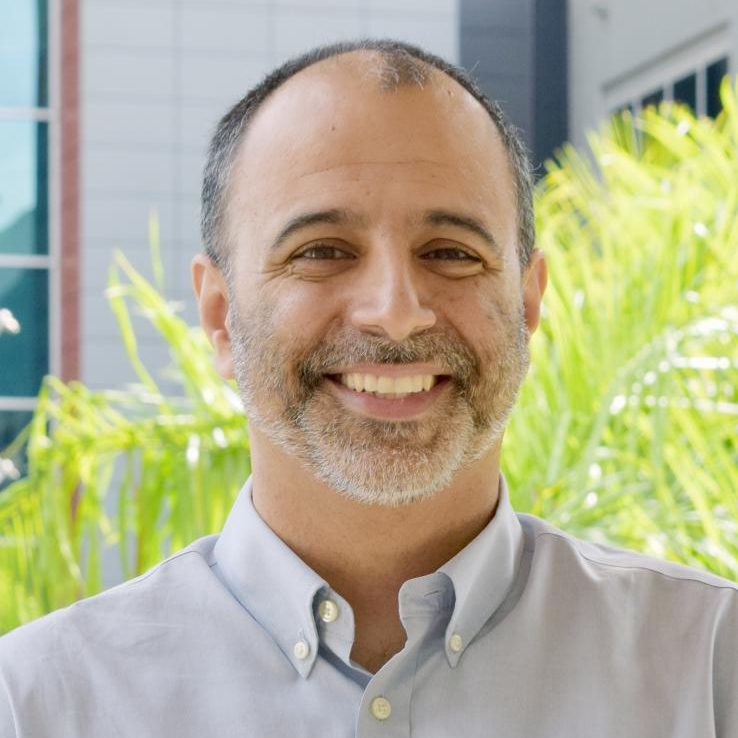 Severe acute malnutrition (SAM) remains a global public health emergency, especially among young children in limited resource settings who are not consuming enough energy, fat, protein, and other nutrients to maintain healthy bodily functions. This places children at high risk of life-threatening infectious diseases, such as diarrhea and pneumonia. Severely malnourished children are often treated at inpatient and outpatient hospital clinics or feeding centers, using protocols promoted by the World Health Organization (WHO). Treatment currently focuses on initial recovery as defined by anthropometric standards without adequately addressing the health of children after discharge from treatment programs. (more…)
Severe acute malnutrition (SAM) remains a global public health emergency, especially among young children in limited resource settings who are not consuming enough energy, fat, protein, and other nutrients to maintain healthy bodily functions. This places children at high risk of life-threatening infectious diseases, such as diarrhea and pneumonia. Severely malnourished children are often treated at inpatient and outpatient hospital clinics or feeding centers, using protocols promoted by the World Health Organization (WHO). Treatment currently focuses on initial recovery as defined by anthropometric standards without adequately addressing the health of children after discharge from treatment programs. (more…)
August 18, 2022
DeWorm3 generates evidence about the cost, acceptability, and optimal delivery of community-wide mass drug administration
Categories: Children, Gut Health and Child Survival, Publication, Research
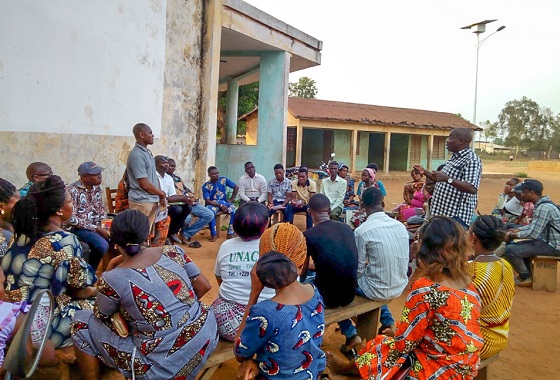
A community sensitization meeting in Benin. Photo courtesy of DeWorm3.
The DeWorm3 Study is an ongoing series of community cluster randomized controlled trials that use a community-wide drug administration (cMDA) approach to determine whether deworming both children and adults can disrupt the transmission of soil-transmitted helminth (STH), or parasitic intestinal worms, across multiple geographies including India, Malawi, and Benin. Achieving high coverage in DeWorm3 is therefore essential to improve the impact of cMDA and limit transmission of STH infections that can result in disabling chronic conditions, delayed growth and cognitive development, severe social stigma, and lost economic productivity.
The DeWorm3 research team recently published three new publications in BMJ Open and BMC Health Services regarding cMDA implementation with findings on the optimal implementation packages for delivering high coverage cMDA for STH, the costs of cMDA vs school-based deworming (SBD), and the implementation climate for cMDA for STH. (more…)
March 23, 2022
Safe and dependable outpatient treatment for infants experiencing malnourishment
Categories: Children, Nutrition
Global WACh is pleased to feature a new publication: “Community-based management of acute malnutrition for infants under 6 months of age is safe and effective: analysis of operational data” by Global WACh faculty Dr. Indi Trehan and UW coauthors Drs. Maeve M Woeltje and Mark J Manary, was featured in Public Health Nutrition December 2021 edition. The study utilized operational data from outpatient feeding clinics in Malawi, which was analyzed in order to evaluate the success of infant recovery under the community-based management of acute malnutrition (CMAM) model. (more…)
October 19, 2021
Joint Nairobi- and Seattle-Based Project Aims to Develop Universal Newborn and Early Childhood Hearing Screening in Kenya
Categories: Children, Research
Researchers from the University of Nairobi, Departments and of Surgery and of Pediatrics and Child Health, Kenyatta National Hospital, the University of Washington Department of Global Health and Paul G. Allen School of Computer Science, and Seattle Children’s Research Institute, are working on the TUNE project: Toward Universal Newborn and Early Childhood Hearing Screening in Kenya. TUNE aims to generate evidence that could allow the development and scale-up of ear and hearing health assessment for newborns and young children in low- and middle-income countries. These goals are consistent with WHO’s recently released “World Report on Hearing”.
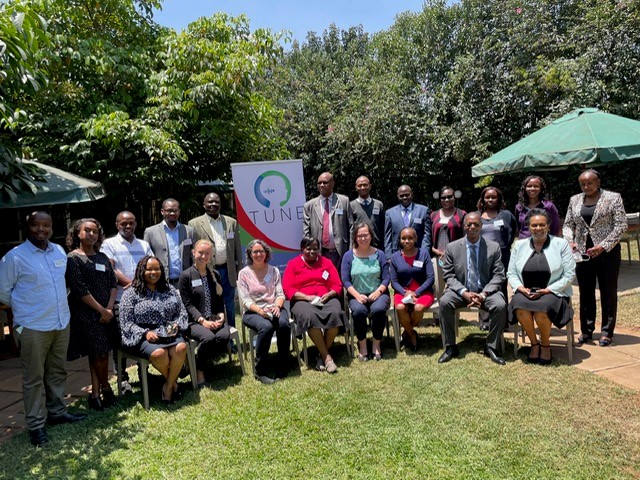
TUNE researchers and stakeholders convened in Kenya in September 2021.
May 18, 2021
Analysis of implementation costs of a nutrition intervention in Malawi childcare centers published in Food and Nutrition Bulletin
Categories: Children, Nutrition, Publication
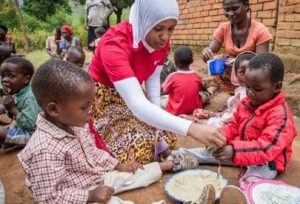 Women, infants, and children need the right quantity and diversity of nutritious foods to support healthy growth and development and to prevent an intergenerational cycle of malnutrition. Meeting this complex need requires coordinated efforts across sectors; however, there is a wide information gap on costs and cost-effectiveness of implementing nutrition intervention strategies that combine agriculture, health, and nutrition components.
Women, infants, and children need the right quantity and diversity of nutritious foods to support healthy growth and development and to prevent an intergenerational cycle of malnutrition. Meeting this complex need requires coordinated efforts across sectors; however, there is a wide information gap on costs and cost-effectiveness of implementing nutrition intervention strategies that combine agriculture, health, and nutrition components.
As part of the Strengthening Economic Evaluations for Multisectoral Strategies for Nutrition (SEEMS-Nutrition) initiative aimed to fill this gap, Dr. Carol Levin (Clinical Associate Professor, Global Health) and researchers at the International Food Policy Research Institute (IFPRI) examined the costs and benefits of an integrated nutrition and agriculture intervention designed to improve the nutritional quality of meals provided through Malawi’s community-based childcare centers (CBCCs)—finding its estimated benefits (assessed as part of a related impact analysis) outweighed the intervention costs. (more…)
February 23, 2021
Researchers receive award to explore low-cost hearing testing technology for universal hearing screening for children in Kenya

Dr. Irene Njuguna, Dr. Dalton Wamalwa, Dr. Sarah Benki-Nugent, Dr. Grace-John-Stewart
Being hearing impaired as a child can be an uphill struggle on top of the usual trials and tribulations of growing up, learning to make friends, and attending school. Globally, approximately 34 million children, many living in sub-Saharan Africa, have disabling hearing loss resulting from head trauma, illness, exposure to loud noises, or certain medical treatments. Early detection and treatment are crucial to prevent children from enduring delays in speech, language, social, and academic development. Due largely to the prohibitive cost of hearing screening equipment (~$7,000 for what is considered standard equipment), hearing screening is rarely conducted in children. (more…)
Next page